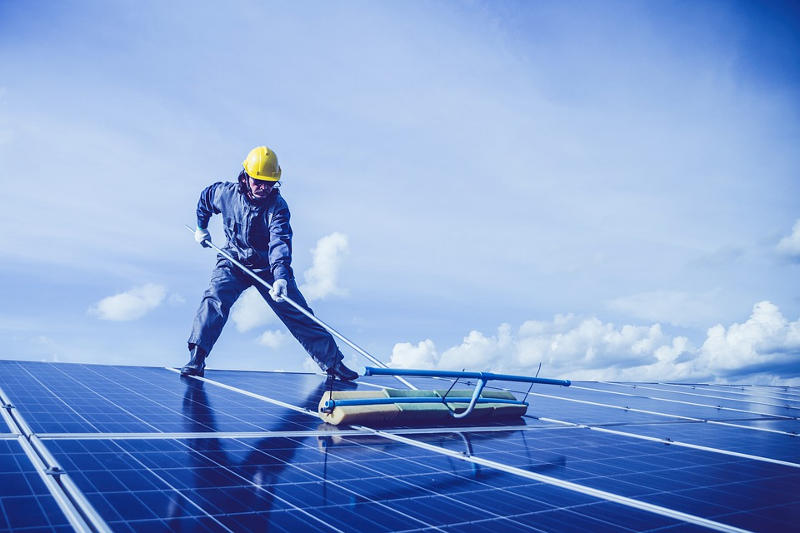Investing in rooftop solar panels is a smart move — but your system only performs at its best when it’s properly maintained. Dust, bird droppings, leaves, and pollution can all reduce your solar panel efficiency by 15–30% or more if not cleaned regularly.
In this blog, we’ll guide you through essential solar panel cleaning and maintenance tips, help you avoid costly mistakes, and explain how to keep your solar investment performing optimally in 2025 and beyond.
Why Cleaning Your Solar Panels Is Important
Solar panels convert sunlight into electricity. But when dirt and debris build up on the glass surface, they block sunlight, reducing your system’s energy output. Studies show that neglected panels can lose 20–30% efficiency, especially in dusty or polluted environments.
Key reasons to clean panels regularly:
- Maintain maximum energy output
- Prolong panel lifespan
- Prevent long-term damage from dirt or water deposits
How to Clean Solar Panels Safely – Step-by-Step
⚠️ Safety First: Always turn off the inverter and follow the manufacturer’s shutdown procedure before cleaning.
1. Choose the right time of day
Clean panels early in the morning or late evening when they’re cool. Cleaning hot panels can cause thermal shock and cracking.
2. Use soft water only
Use deionized or distilled water if available. Hard water can leave mineral deposits that reduce efficiency.
3. Use soft tools
Use a soft brush, microfiber cloth, or sponge. Avoid abrasive scrubbers or steel wool that can scratch the surface.
4. Avoid soap or chemicals
Mild dish soap is acceptable if necessary, but many manufacturers recommend plain water. Avoid detergents with ammonia or acid.
5. Rinse and let it dry naturally
Don’t wipe panels dry — allow water to evaporate naturally or use a squeegee if needed.
Common Mistakes to Avoid
Avoid these common errors during solar panel maintenance:
| Mistake | Why it’s risky |
|---|---|
| Using high-pressure washers | Can damage seals and panel frames |
| Cleaning with hot water | Risk of cracking the glass |
| Standing or walking on panels | Causes cracks and reduces lifespan |
| Skipping shutdown procedures | Electrical hazard |
Maintenance Tips to Maximize Solar Panel Life
| Tip | Recommendation |
|---|---|
| 📅 Cleaning frequency | Once every 1–2 months (more often in dusty regions) |
| 📊 Monitor performance | Use your inverter or app to track daily output |
| 🧑🔧 Annual professional check-up | Have a licensed technician inspect the system once a year |
| 🌧️ After heavy rain | Clean panels to remove dried mud or debris |
| 📷 Take photos | Monitor visual wear and dirt over time |
When to Call a Professional
You should schedule professional maintenance when:
- You notice a sudden drop in solar output (20% or more)
- Inverter shows error messages or shutoff alerts
- Wiring appears loose, corroded, or damaged
- You are unable or uncomfortable cleaning panels safely
Tip: Consider an AMC (Annual Maintenance Contract) from your solar provider for regular servicing, emergency visits, and guaranteed uptime.
Frequently Asked Questions (FAQs)
1. How often should I clean my solar panels?
At least once every 2 months. In high-dust or coastal areas, clean once every 2–4 weeks.
2. Will rain clean my solar panels?
Rain helps a bit but won’t remove bird droppings, sticky pollen, or fine dust. Manual cleaning is still necessary.
3. Can I use soap or glass cleaner?
Avoid harsh chemicals. Use only soft water and mild soap if required. Never use Windex or abrasive cleaners.
4. Is it safe to walk on solar panels?
No. Walking on panels can cause micro-cracks and invalidate your warranty.
5. Do I need a professional for cleaning?
For tall buildings, difficult roof access, or commercial systems, yes. Otherwise, homeowners can clean safely with proper tools.
Conclusion
Proper cleaning and maintenance of your solar panels is essential to get the best return on your investment. With just a few minutes of effort each month, you can increase efficiency, extend system life, and prevent costly damage. If you’re unsure, always reach out to a trusted service provider.
Remember: Clean panels = More power = Lower bills.

